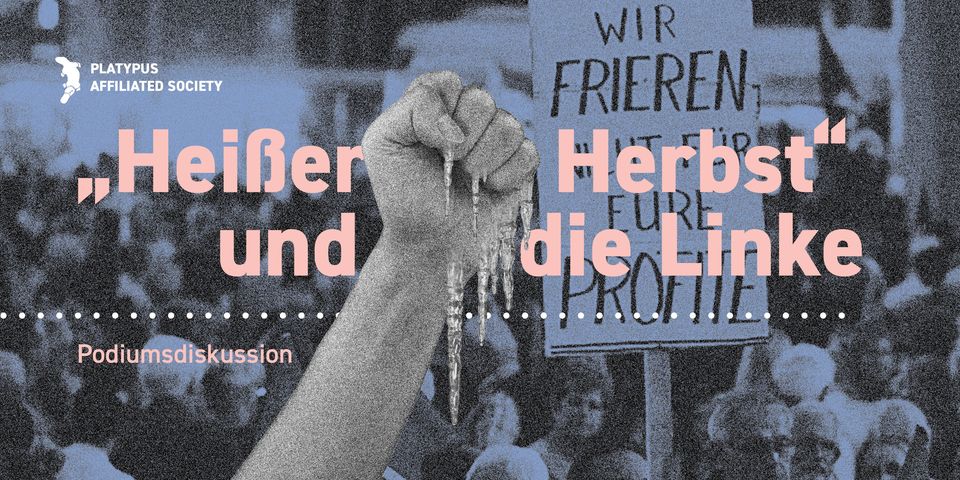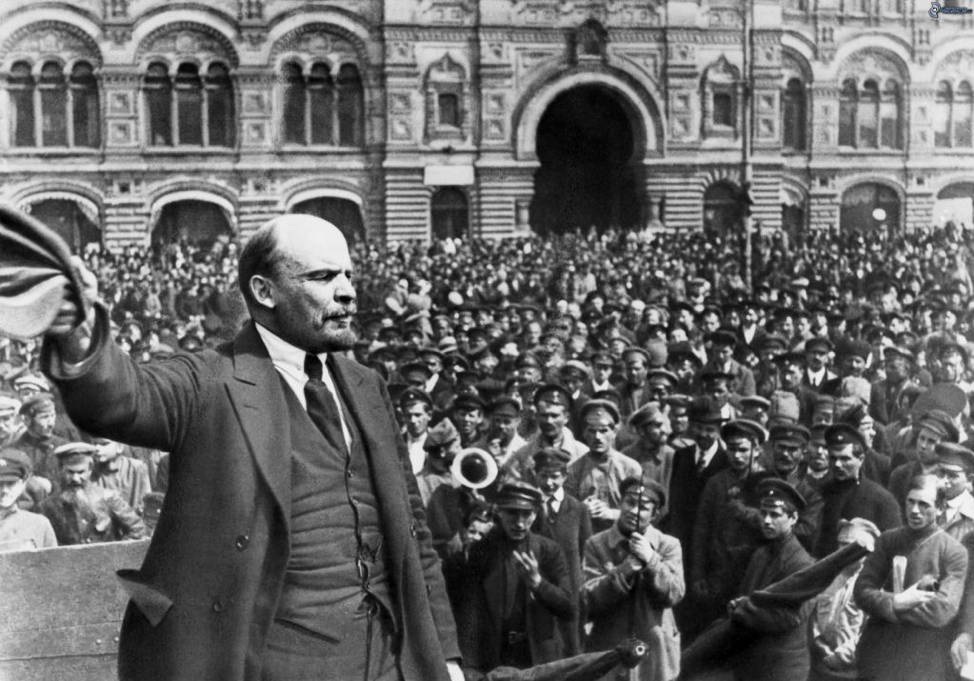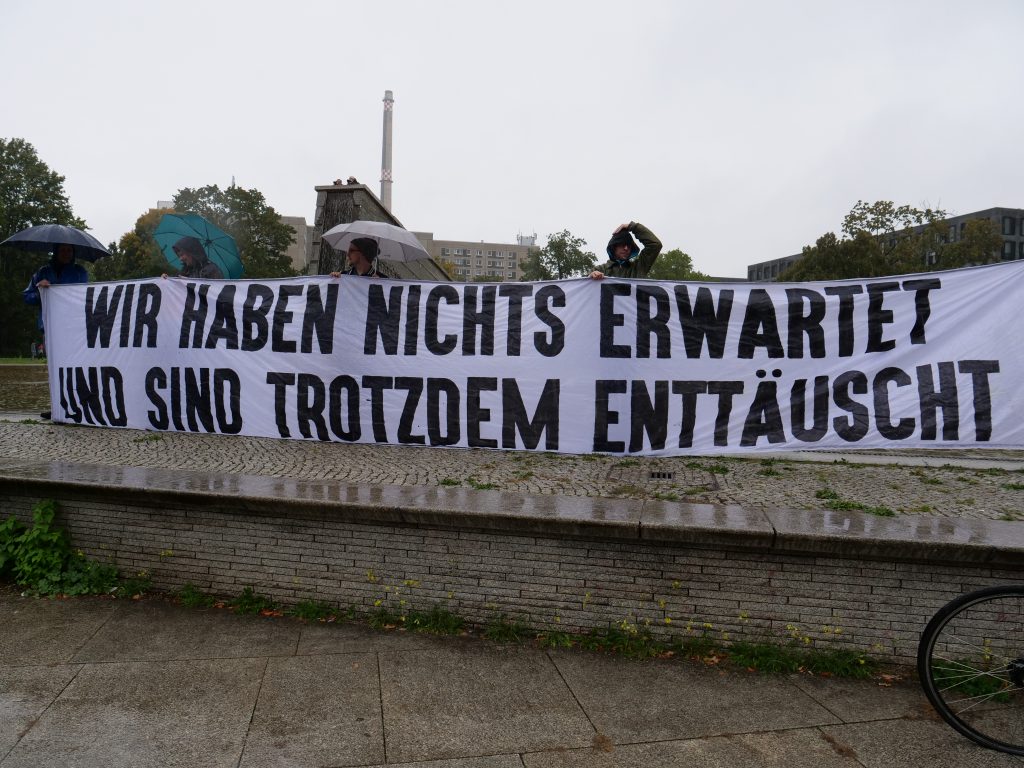
“Society is a reality sui generis; it has its own characteristics that are either not found in the rest of the universe or are not found there in the same form."
"Society is a sui generis being with its own special nature, distinct from that of its members, and a personality of its own different from individual personalities."
-- Emile Durkheim
"Society is a concept of the Third Estate."
-- Adorno
Wednesdays
7.30 pm
Laidak, Boddinstr. 42, Neukölln
( • required / + recommended readings)
Required background reading:
• Chris Cutrone, "Back to Herbert Spencer! Industrial vs. militant society" (2016) [audio]
Recommended supplemental parallel reading:
+ Adorno, "Static and Dynamic as Sociological Categories" (1961)
+ Adorno, Introduction to Sociology 1962 lectures
+ Adorno, Philosophical Elements of a Theory of Society 1964 lectures
+ Adorno, Philosophy and Sociology 1960 lectures
Preliminary readings:
• Adorno, “Society” (1965)
• Benjamin Constant, "The liberty of the ancients compared with that of the moderns" (1819)
Charts of terms:
+ Capital in history timeline and chart of terms
+ Being and becoming (freedom in transformation) / immanent dialectical critique chart of terms
+ Capitalist contradiction chart of terms
+ Commodity form chart of terms
+ Reification chart of terms
Week 1: June 21, 2022
• Adorno, “Society” (1965)
+ Chris Cutrone, "Gillian Rose's 'Hegelian' critique of Marxism" (2010)
• Gillian Rose, Hegel Contra Sociology (1981/95) selections: Preface for 1995 reprint, 1. The Antinomies of Sociological Reason, 7. With What Must the Science End?
Week 2: June 28, 2022
• epigraphs on modern history and freedom by Louis Menand (on Marx and Engels), Karl Marx, on "becoming" (from the Grundrisse, 1857–58)
• Max Weber, The Protestant Ethic and the Spirit of Capitalism (1905) selections: Author's Introduction, Part I Chapters 1-3, Part II (+ Chapter 4,) Chapter 5
Week 3: July 5, 2022
• Auguste Comte, Introduction to Positive Philosophy (1830-42) I. The nature and importance of the positive philosophy; The Positive Philosophy of Auguste Comte vol. III Bk. VI. Social Physics pp. 1-11, 199-216, 277-344 [PDF Positive Philosophy of Comte selections]; A General View of Positivism Ch. II. The Social Aspect of Positivism pp. 63-78, Ch. VI. The Religion of Humanity pp. 340-426 [PDF General View of Positivism selections]
+ Chris Cutrone, "Ends of philosophy" (2018)
Week 4: June 12, 2022
+ Chris Cutrone, "Back to Herbert Spencer! Industrial vs. militant society" (2016) [audio]
• Herbert Spencer, Principles of Sociology Vol. I Part I The Data of Sociology Ch. I-IV pp. 3-40 [PDF] and Part II The Inductions of Sociology Ch. I-II pp. 447-462 [PDF]; On Social Evolution (Univ. Chicago selections): IV 15–16 Societal Typologies, Militancy and Industrialism and V 18–19 Ceremonial and Political Institutions; The Man Versus the State VI The Great Political Superstition [PDF selection]
Week 5: July 19, 2022
• Emile Durkheim, Chapter 3. "The principles of 1789 and sociology" (1890); Elementary Forms of Religious Life (1912) Introduction, selections V Social Creativity Ch. 11-12, in On Morality and Society
Week 6: July 26, 2022
• Durkheim, Chapter 10. "The dualism of human nature and its social conditions" (1914), Ch. 4. "Individualism and the intellectuals" (1898); The Division of Labor in Society (1893) Author's Preface to the 1st Edition and Introduction (pp. xxv-xxx and 1-10), selection IV The Evolution of Morality Ch. 6, in On Morality and Society
Week 7: August 2, 2022
• Durkheim, The Division of Labor in Society (1893) selections IV. The Evolution of Morality Chapters 7-9, in On Morality and Society; Author's Preface to the 2nd Edition (pp. xxxi-lix)
Week 8: August 9, 2022
• Frankfurt School, Aspects of Sociology (1956) selections: Preface by Horkheimer and Adorno, Chapters I-VI, XII
• Adorno, “Society” (1965)
+ Adorno, "Static and Dynamic as Sociological Categories" (1961)

Der Marxismus nach dem Tod von Marx und Engels erfährt mit dem rasanten Wachstum der Arbeiterbewegung und der Entstehung der zweiten Internationale den Charakter einer politischen Massenbewegung, die sich in alle Teile der Welt verbreitet. Wir möchten im ersten Teil des Lesekreises genauer betrachten, worin der berühmt-berüchtigte Marxismus der Arbeiterbewegung bestanden und welche Krise ihn vor dem Beginn des Ersten Weltkrieges erfasst hat. Der Kampf gegen diese “Krise des Marxismus” hat mit der Oktoberrevolution und der deutschen Arbeiterrevolution von 1918-19 einen welthistorischen Maßstab erreicht, der die Hoffnungen und Katastrophen des zwanzigsten Jahrhunderts vorbereitete. Was war das Ziel der 1917 eingeleiteten internationalen Revolution und wie ist diese gescheitert? Welche politischen und ideologischen Konsequenzen folgten daraus?
Um diese Fragen näher zu beleuchten, werden wir uns in der zweiten Hälfte des Semesters mit den Reflexionen dieser Entwicklungen beschäftigen, wie sie von zentralen Figuren der Frankfurter Schule entwickelt wurden. Mit Lukács, Benjamin, Horkheimer und Adorno werden wir die Spannung, Kontinuität und Differenz zu den Vertretern der klassischen Periode des Marxismus entwickeln und uns somit ein bedeutendes Instrumentarium zum Verständnis der gegenwärtigen Welt anzueignen suchen. Das problematische Verhältnis von Theorie und Praxis im Marxismus und seiner Entwicklung hat die Welt des zwanzigsten Jahrhunderts entscheidend geprägt und hinterlässt ihre Narben bis in die Gegenwart. Mit der Erforschung dieses Verhältnisses möchten wir Aufschluss darüber erhalten, wie die Vergangenheit unsere eigene Imagination der Zukunft in Bann hält.
Die Texte werden im Voraus gelesen und dann zusammen diskutiert. Alle, die neu einsteigen wollen sind herzlich willkommen und es werden keine Vorkenntnisse benötigt!
Zeit: Mittwochs 18:30-21:30, ab 12.4.2023
Ort: HU Berlin, Raum wöchentlich tba über Telegram und andere Kanäle
• vorausgesetzte Texte
+ zusätzlich, empfohlene Texte
Empfohlene Vorbereitungs- und Hintergrundliteratur
+ Edmund Wilson: „To the Finland Station: A Study in the Writing and Acting of History“ (1940), Part II. Ch. (1–4,) 5–10, 12–16; Part III. Ch. 1–6
+ Carl Schorske, The SPD 1905-17: The Development of the Great Schism (1955)
+ Leszek Kolakowski: „Der Sinn des Begriffes ‘Linke’” (1958)
+ J.P. Nettl, Rosa Luxemburg(1966) [Vol. 1] [Vol. 2]
+ James Joll: „The Second International 1889–1914“ (1966)
+ Sebastian Haffner: “Die deutsche Revolution 1918/19” (1968)
+ Richard Appignanesi and Oscar Zarate / A&Z: “Lenin für Anfänger” (1977)
+ Tariq Ali and Phil Evans: „Trotzki für Anfänger“ (1980)
Sitzungen
Woche 17. Revolutionäre Führung | 12. April
• Rosa Luxemburg, „Die ‚Junius-Broschüre‘ / Krise der Sozialdemokratie“ Teil I. (1916)
• J. P. Nettl, “The German Social Democratic Party 1890–1914 as a Political Model” (1965)
• Cliff Slaughter, “What is Revolutionary Leadership?” (1960)
Woche 18. Reform oder Revolution? | 19. April
• Luxemburg, „Sozialreform oder Revolution“ (1899)
+ Eugene Debs, “Competition vs. Cooperation” (1900)
Woche 19. Lenin und die Avantgardepartei | 26. April
• Spartakist-Broschüre, Lenin und die Avantgardepartei (1978)
+ Richard Appignanesi and Oscar Zarate / A&Z, Introducing Lenin and the Russian Revolution / Lenin for Beginners (1977)
Woche 20. Was tun? | 3. Mai
W. I. Lenin, „Was tun?“ (1902)
+ Richard Appignanesi and Oscar Zarate / A&Z, Introducing Lenin and the Russian Revolution / Lenin for Beginners (1977)
Woche 21. Massenstreik und Sozialdemokratie | 10. Mai
• Luxemburg, „Massenstreik, Partei und Gewerkschaften“ (1906)
+ Luxemburg, „Blanquismus und Sozialdemokratie“ (1906)
Woche 22. Permanente Revolution | 17. Mai
• Leo Trotzki, „Ergebnisse und Perspektiven“ (1906)
+ Tariq Ali and Phil Evans, Introducing Trotsky and Marxism / Trotsky for Beginners (1980)
Woche 23. Staat und Revolution | 24. Mai
• Lenin, „Staat und Revolution“ (1917)
Woche 24. Imperialismus | 31. Mai
“Es ist die Sache der Bourgeoisie, die Trusts zu fördern, Kinder und Frauen in die Fabriken zu jagen, sie dort zu martern, zu korrumpieren, unsäglichem Elend preiszugeben. Wir „unterstützen“ diese Entwicklung nicht, wir „fordern“ so etwas nicht, wir kämpfen dagegen. Aber wie kämpfen wir? Wir erklären, die Trusts und die Fabrikarbeit der Frauen sind progressiv. Wir wollen nicht zurück, zum Handwerk, zum vormonopolistischen Kapitalismus, zur Hausarbeit der Frauen. Vorwärts über die Trusts usw. hinaus und durch sie zum Sozialismus.”
– Lenin: Das Militärprogramm der proletarischen Revolution (1916)
• Lenin, „Der Imperialismus als höchstes Stadium des Kapitalismus“ (1916)
+ Lenin, „Sozialismus und Krieg“ (1915)
Woche 25. Scheitern der Revolution | 7. Juni
• Luxemburg, „Was will der Spartakusbund?“ (1918)
• Luxemburg, „Unser Programm und die politische Situation“ (1918)
+ Luxemburg, „Die Sozialisierung der Gesellschaft“ (1918)
+ Luxemburg, „Die russische Tragödie“ (1918)
+ Luxemburg, „Die Ordnung herrscht in Berlin“ (1919)
+ Eugene Debs, “The Day of the People” (1919)
+ Sebastian Haffner: „Die deutsche Revolution 1918/19“ (1968) [engl. PDF]
Woche 26. Rückzug nach der Revolution | 14. Juni
• Lenin, „Der „Linke Radikalismus“, die Kinderkrankheit im Kommunismus“ (1920)
+ Lenin, „Notizen eines Publizisten“ (1922/24)
Woche 27. Dialektik der Verdinglichung | 21. Juni
• Georg Lukács, „Der Standpunkt des Proletariats“ (= Teil III. des Kapitels „Die Verdinglichung und das Bewußtsein des Proletariats“) in Geschichte und Klassenbewusstsein (1923)
+ Being and becoming (freedom in transformation) / immanent dialectical critique chart of terms
+ Commodity form chart of terms
+ Capitalist contradiction chart of terms + Organic composition of capital chart of terms
+ Reification chart of terms
+ Lukács, „Das Phänomen der Verdinglichung“ (Teil I des Kapitels „Die Verdinglichung und das Bewusstsein des Proletariats“, in Geschichte und Klassenbewusstsein (1923)
Woche 28. Lehren des Oktobers | 28. Juni
• Trotzki, „1917 – Die Lehren des Oktobers“ (1924)
• Trotzki, „Bolschewismus und Stalinismus“ (1937)
Woche 29. Trotzkismus | 5. Juli
+ Trotzki, “To Build Communist Parties and an International Anew” (1933)
+ Trotzki, „Wenn Amerika kommunistisch würde“ (1934)
• Trotzki, „Der Todeskampf des Kapitalismus und die Aufgaben der 4. Internationale“ (Das Übergangsprogramm) (1938)
+ Trotzki, „Die Gewerkschaften in der Epoche des imperialistischen Niedergangs“ (1940)
+ Trotzki, „Brief an James P. Cannon“ (1939)
Woche 30. Der autoritäre Staat | 12. Juli
• Friedrich Pollock, „Staatskapitalismus“ (1941)
• Max Horkheimer, „Autoritärer Staat“ (1940/1942)
+ Capitalist contradiction chart of terms
Woche 31. Über den Begriff der Geschichte | 19. Juli
• epigraphs by Louis Menand (on Edmund Wilson) and Peter Preuss (on Nietzsche) on the modern concept of history
+ Charles Baudelaire, from Fusées [Rockets] (1867)
+ Bertolt Brecht, „An die Nachgeborenen“ (1939)
+ Walter Benjamin, „Zum Planetarium“ (aus: Einbahnstraße, 1928)
+ Benjamin, „Feuermelder“ (aus: Einbahnstraße, 1928)
+ Benjamin, „Erfahrung und Armut“ (1933)
+ Benjamin, Theologisch-politisches Fragment (1921/39?)
+ Benjamin on history chart of terms
• Benjamin, „Über den Begriff der Geschichte“ (1940)
• Benjamin, „Paralipomena zu den Thesen Über den Begriff der Geschichte“ (1940)
+ Benjamin, Das Passagen-Werk Konvolut N, „Erkenntnistheoretisches, Theorie des Fortschritts“ (v. a. S. 588 f.)
+ Being and becoming (freedom in transformation) / immanent dialectical critique chart of terms
Woche 32. Reflexionen über den Marxismus | 26. Juli
+ Capital in history timeline and chart of terms
+ Benjamin on history chart of terms
• Theodor Adorno, „Reflexionen zur Klassentheorie“ (1942)
• Adorno, „Ausschweifung“ (Anhang Minima Moralia) (1944–47)
+ Being and becoming (freedom in transformation) / immanent dialectical critique chart of terms
+ Adorno, „Zueignung“, „Vermächtnis“, „Vor Mißbrauch wird gewarnt“ und „Zum Ende“ aus Minima Moralia (1944-47)
+ Horkheimer and Adorno, Diskussion über Theorie und Praxis (1956)
Woche 33. Theorie und Praxis | 2. August
+ Adorno, „Zu Subjekt und Objekt“ (1969)
+ Commodity form chart of terms
+ Reification chart of terms
+ Capitalist contradiction chart of terms
+ Adorno's critique of actionism chart of terms
• Adorno, „Marginalien zu Theorie und Praxis“ (1969)
• Adorno, „Resignation“ (1969)
+ Being and becoming (freedom in transformation) / immanent dialectical critique chart of terms
+ Adorno, „Spätkapitalismus oder Industriegesellschaft?“ (1968) [Audio]
+ Organic composition of capital chart of terms
+ Esther Leslie, Introduction to the 1969 Adorno-Marcuse correspondence (1999)
+ Adorno and Herbert Marcuse, „Briefwechsel über die Neue Linke“ [Dokumente Nr. 300, 313, 322, 336, 338, 340 & 349] (1969)
+ Der Spiegel, Interview mit T. W. Adorno: „Keine Angst vor dem Elfenbeinturm“ (1969)

In ganz Europa haben die in die Höhe schießenden Energiepreise und die Inflation zu einer Krise der Lebenshaltungskosten geführt, die durch die Lockdowns und den anhaltenden Krieg in der Ukraine ausgelöst wurde. Als Reaktion darauf sind Proteste und Kampagnen ins Leben gerufen worden. Die Platypus Affiliated Society lädt Euch ein, über die Bedeutung der aktuellen Krise und die Antworten der Linken darauf zu diskutieren.
Wie lässt sich die gegenwärtige Krise verstehen?
Wie hat die Linke bisher auf die Krise reagiert, und wie sollte sie auf
diese Situation reagieren? Vor welchen Aufgaben steht die Linke in der
gegenwärtigen Krise und welchen Hindernissen steht sie gegenüber? Gibt
es historische Präzedenzfälle, aus denen die Linke lernen kann?
Friederike Benda (DIE LINKE) ist leider erkrankt, daher ändert sich die Zusammensetzung des Podiums wie folgt:
Marek Schauer (Jurist und Journalist)
Marcus Staiger (Heizung, Brot & Frieden)
Wilhelm Schulz (Gruppe ArbeiterInnenmacht)
Peter Nowak (freier Journalist)
Zeit: Donnerstag, den 16. Februar 2023 um 19 Uhr
Ort: Humboldt Universität, Hauptgebäude, Unter den Linden 6, Seminaraum 3059

Wednesdays, 19:30 - 22:30 PM
Laidak
Boddinstr. 42, Berlin-Neukölln
Join at any time / no prior knowledge assumed
• required / + recommended reading
Recommended winter break preliminary readings:
+ Leszek Kolakowski, “The concept of the Left” (1968)
+ Richard Appignanesi and Oscar Zarate / A&Z, Introducing Lenin and the Russian Revolution / Lenin for Beginners (1977)
+ Sebastian Haffner, Failure of a Revolution: Germany 1918–19 (1968)
+ Tariq Ali and Phil Evans, Introducing Trotsky and Marxism / Trotsky for Beginners (1980)
+ James Joll, The Second International 1889–1914 (1966)
+ Carl Schorske, The SPD 1905-17: The Development of the Great Schism (1955)
+ J.P. Nettl, Rosa Luxemburg (1966) [Vol. 1] [Vol. 2]
+ Edmund Wilson, To the Finland Station: A Study in the Writing and Acting of History (1940), Part II. Ch. (1–4,) 5–10, 12–16; Part III. Ch. 1–6
II. Introduction to revolutionary Marxism
Week 11. Revolutionary leadership | Feb. 1, 2023
• Rosa Luxemburg, “The Crisis of German Social Democracy” Part 1 (1915)
• J. P. Nettl, “The German Social Democratic Party 1890–1914 as a Political Model” (1965)
• Cliff Slaughter, “What is Revolutionary Leadership?” (1960)
Week 12. Reform or revolution? | Feb. 8, 2023
• Luxemburg, Reform or Revolution? (1900/08)
+ Eugene Debs, "Competition versus Cooperation" (1900)
Week 13. Lenin and the vanguard party | Feb. 15, 2023
• Spartacist League, Lenin and the Vanguard Party (1978)
+ Richard Appignanesi and Oscar Zarate / A&Z, Introducing Lenin and the Russian Revolution / Lenin for Beginners (1977)
Week 14. What is to be done? | Feb. 22, 2023
• V. I. Lenin, What is to be Done? (1902)
+ Richard Appignanesi and Oscar Zarate / A&Z, Introducing Lenin and the Russian Revolution / Lenin for Beginners (1977)
Week 15. Mass strike and social democracy | Mar. 1, 2023
• Luxemburg, The Mass Strike, the Political Party and the Trade Unions (1906)
+ Luxemburg, "Blanquism and Social Democracy" (1906)
Week 16. Permanent revolution | Mar. 8, 2023
• Leon Trotsky, Results and Prospects (1906)
+ Tariq Ali and Phil Evans, Introducing Trotsky and Marxism / Trotsky for Beginners (1980)
Week 17 | Mar. 15, 2023 (spring break)
Week 18 State and revolution| Mar. 22, 2023
• Lenin, The State and Revolution (1917)
Week 19. Imperialism | Mar. 29, 2023
“The bourgeoisie makes it its business to promote trusts, drive women and children into the factories, subject them to corruption and suffering, condemn them to extreme poverty. We do not ‘demand’ such development, we do not ‘support’ it. We fight it. But how do we fight? We explain that trusts and the employment of women in industry are progressive. We do not want a return to the handicraft system, pre-monopoly capitalism, domestic drudgery for women. Forward through the trusts, etc., and beyond them to socialism!”
— Lenin, The Military Programme of the Proletarian Revolution (1916/17)
• Lenin, Imperialism, the Highest Stage of Capitalism (1916)
+ Lenin, Socialism and War Ch. 1 The principles of socialism and the War of 1914–15 (1915)
Week 20. Mar. 31 - Apr. 2, 2023 Apr. 1, 2023 [Platypus international convention]
Week 21. Failure of the revolution |tba
• Luxemburg, “What does the Spartacus League Want?” (1918)
• Luxemburg, “On the Spartacus Programme” (1918)
+ Luxemburg, "German Bolshevism" (AKA "The Socialisation of Society") (1918)
+ Luxemburg, “The Russian Tragedy” (1918)
+ Luxemburg, “Order Reigns in Berlin” (1919)
+ Eugene Debs, “The Day of the People” (1919)
+ Sebastian Haffner, Failure of a Revolution: Germany 1918–19 (1968)
Week 22. Retreat after revolution | Apr. 19th
• Lenin, “Left-Wing” Communism: An Infantile Disorder (1920)
+ Lenin, "Notes of a Publicist" (1922)
Week 23. Dialectic of reification | Apr. 26th
• Lukács, “The Standpoint of the Proletariat” (Part III of “Reification and the Consciousness of the Proletariat,” 1923). Available in three sections from marxists.org: section 1 section 2 section 3
+ Being and becoming (freedom in transformation) / immanent dialectical critique chart of terms
+ Commodity form chart of terms
+ Capitalist contradiction chart of terms + Organic composition of capital chart of terms
+ Reification chart of terms
+ Lukács, “The phenomenon of reification” (Part I of “Reification and the consciousness of the proletariat,” History and Class Consciousness, 1923)
Week 24. Lessons of October | May 3rd
• Trotsky, The Lessons of October (1924) [PDF]
• Trotsky, "Stalinism and Bolshevism" (1937)
Week 25. Trotskyism | May 10th
+ Trotsky, "To build communist parties and an international anew" (1933)
+ Trotsky, "If America should go communist" (1934)
• Trotsky, The Death Agony of Capitalism and the Tasks of the Fourth International (AKA The Transitional Program and the Struggle for Socialism, 1938)
+ Trotsky, "Trade unions in the epoch of imperialist decay" (1940)
+ Trotsky, Letter to James Cannon (September 12, 1939)
Week 26. The authoritarian state | May 17th
• Friedrich Pollock, "State Capitalism: Its Possibilities and Limitations" (1941) (note 32 on USSR)
• Max Horkheimer, "The Authoritarian State" (1942) [PDF]
+ Capitalist contradiction chart of terms
Week 27. On the concept of history | May 24th
• epigraphs by Louis Menand (on Edmund Wilson) and Peter Preuss (on Nietzsche) on the modern concept of history
+ Charles Baudelaire, from Fusées [Rockets] (1867)
+ Bertolt Brecht, "To posterity" (1939)
+ Walter Benjamin, "To the planetarium" (from One-Way Street, 1928)
+ Benjamin, "Fire alarm" (from One-Way Street, 1928)
[JPG] [PDF]
+ Benjamin, "Experience and poverty" (1933)
+ Benjamin, Theologico-political fragment (1921/39?)
+ Benjamin on history chart of terms
• Benjamin, "On the Concept of History" (AKA "Theses on the Philosophy of History") (1940) [PDF]
• Benjamin, Paralipomena to "On the Concept of History" (1940)
+ Benjamin, Arcades Project Convolute N, "On the theory of knowledge, theory of progress" (see especially p. 471 [N8,1] on Horkheimer on unredeemablility of past suffering)
+ Being and becoming (freedom in transformation) / immanent dialectical critique chart of terms
Week 28. Reflections on Marxism | May 31st
+ Capital in history timeline and chart of terms
+ Benjamin on history chart of terms
• Theodor Adorno, “Reflections on Class Theory” (1942)
• Adorno, “Imaginative Excesses” (1944–47)
+ Being and becoming (freedom in transformation) / immanent dialectical critique chart of terms
+ Adorno, Dedication, "Bequest", "Warning: Not to be Misused" and "Finale", Minima Moralia (1944–47)
+ Horkheimer and Adorno, "Discussion about Theory and Praxis" (AKA "Towards a New Manifesto?") [Deutsch] (1956)
Week 29. Theory and practice | June 7th
+ Adorno, “On Subject and Object” (1969)
+ Commodity form chart of terms
+ Reification chart of terms
+ Capitalist contradiction chart of terms
+ Adorno's critique of actionism chart of terms
• Adorno, “Marginalia to Theory and Praxis” (1969)
• Adorno, “Resignation” (1969)
+ Being and becoming (freedom in transformation) / immanent dialectical critique chart of terms
+ Adorno, “Late Capitalism or Industrial Society?” (AKA “Is Marx Obsolete?”) (1968)
+ Organic composition of capital chart of terms
+ Esther Leslie, Introduction to the 1969 Adorno-Marcuse correspondence (1999)
+ Adorno and Herbert Marcuse, correspondence on the German New Left (1969)
+ Adorno, Interview with Der Spiegel magazine (1969)

Die Podiumsdiskussion soll „Reform, Revolution und Widerstand“ als prominente Vorstellungen sozialen Wandels kritisch hinterfragen und historisch einordnen. Alle stellen problematische Formen des historischen und gegenwärtigen „Antikapitalismus” dar, ohne dass Klarheit darüber herrscht, wie genau sich diese Vorstellungen zu einer sozialistischen Strategie verhalten – im Gegenteil, gerade angesichts vergangener Niederlagen der Linken und einer sich immer weiter zuspitzenden Krise linker Orientierungen fällt auf, dass diese Konzepte heute diffuser sind denn je.
Welche Bedeutung haben die Kategorien „Reform, Revolution und Widerstand“ für die heutige Linke? Wie werden sie benutzt, was sollen sie bewirken und wie ist ihre Geschichte?
+++ Audioaufnahme auf YouTube +++
Mit:
Anna (früher postautonom organisiert)
Michael Brie (Vorsitzender des wissenschaftlichen Beirats der Rosa Luxemburg Stiftung)
Dennis Graemer (Landian, Maschinenfragment- Marxist, Kybernetikfan)
Alexander Neupert-Doppler (Utopie-Netzwerk)
Zeit: Mittwoch, den 26.10.2022 um 19 Uhr
Ort: Humboldt Universität, Universitätsgebäude am Hegelplatz,
Raum 1.401 (Dorotheenstr. 24)

